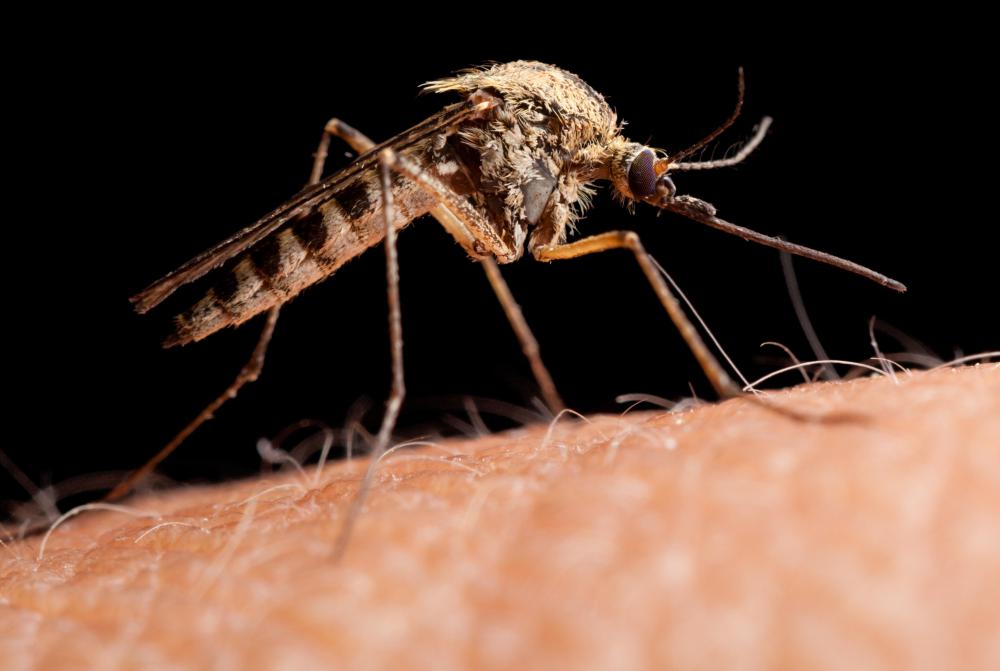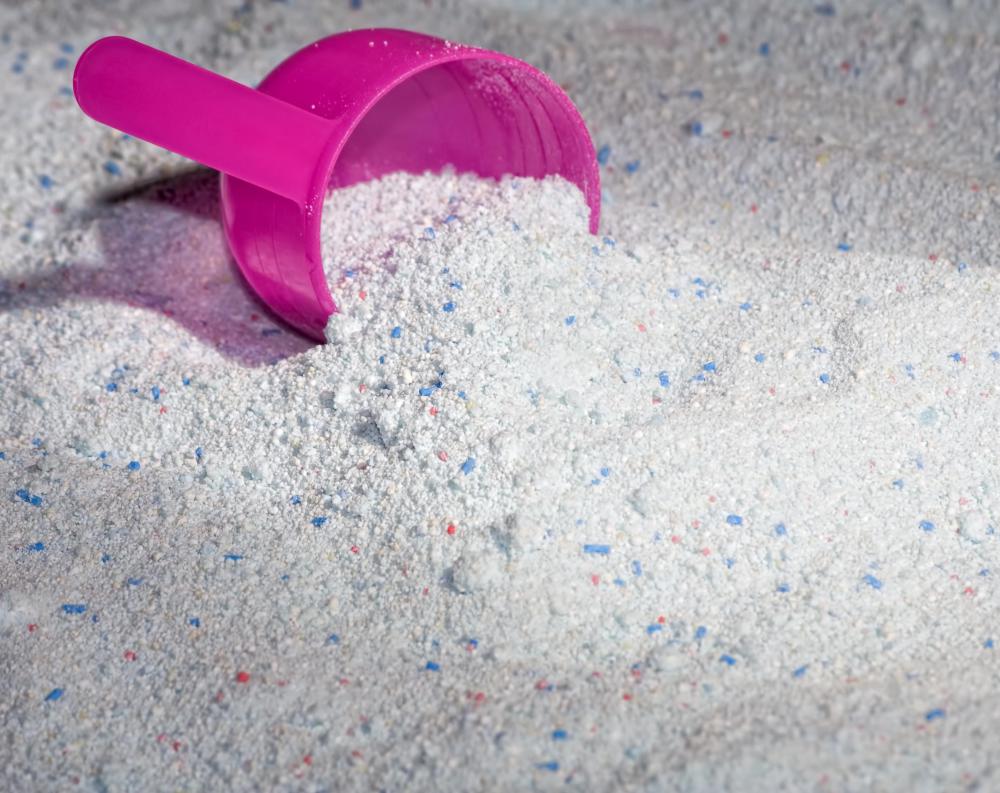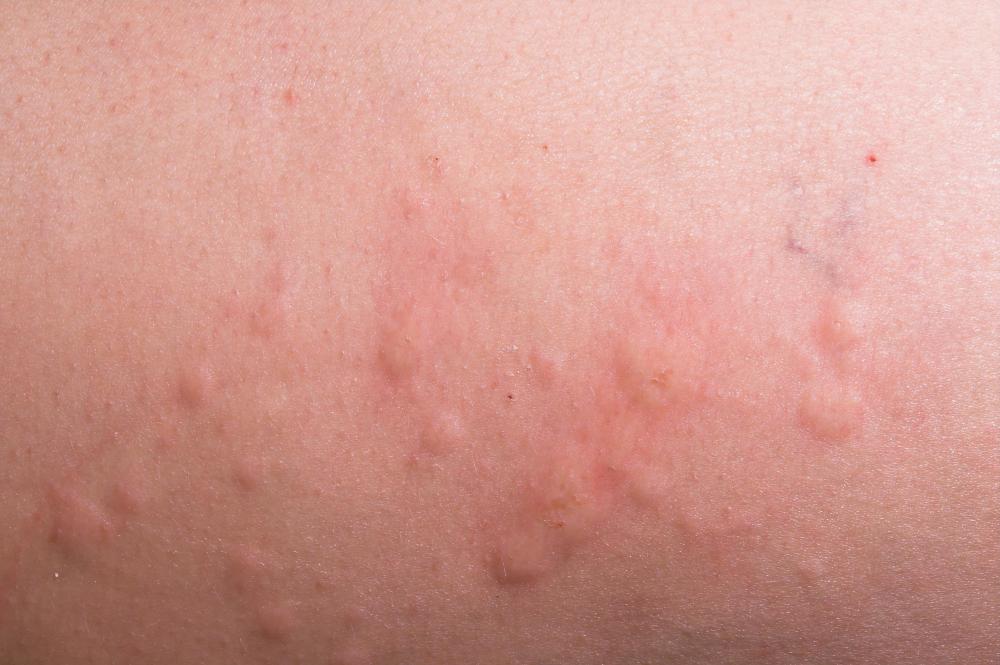At WiseGEEK, we're committed to delivering accurate, trustworthy information. Our expert-authored content is rigorously fact-checked and sourced from credible authorities. Discover how we uphold the highest standards in providing you with reliable knowledge.
What are the Common Causes of Hives on the Legs?
Some common causes of hives on the legs are reactions to fabrics or dyes, insect bites, and sweat. If a person is wearing new pants or has tried a new detergent and experiences hives, he or she might be allergic to a dye or other chemical. Insect bites can also cause this reaction, especially if the person was recently outdoors or seems to have an infestation of some sort in his or her home. Sweat can also cause hives when exercising, playing sports, or even doing nothing on a hot day. Some cases of hives are classified as idiopathic, meaning there is no known case.
Chemicals on a person’s pants or socks can cause irritation to the skin of the legs, leading to hives. This situation often happens because of a reaction to dyes, detergents, and fabric softeners on clothing. A few ways of testing for these problems include changing clothes, removing contaminants from the clothing, and switching to a cleaning method that is free of irritating substances. Clothing itself can also irritate the skin for other reasons; improperly fitted clothing, especially worn while moving around or exercising, can cause hives on the legs.

Insects, like wasps, ants, and bees, can cause hives wherever they bite or sting. Bites are not always noticed, so people sometimes attribute their symptoms to other causes. Bug and insect bites can cause serious symptoms, such as anaphylactic shock, in some people, in addition to milder symptoms like hives in others.
Some people find that sweating causes hives, occasionally leading to the belief that they are allergic to their own sweat. In some cases, the sweat rubs against clothing, irritates the skin, and eventually causes hives. Other cases, however, might have little to do with the sweat itself. A person might actually be sensitive to the soap or lotion he or she uses, and sweating spreads it around the skin. Some people react to a food or drink that irritates the skin when it is sweated out.

In some cases, hives are idiopathic, meaning that medical professionals are not sure of the root cause. Often, underlying problem is never found, or, in more extreme cases of hives, it turns out that the patient has an overactive immune system. Most cases of hives are mild and go away within hours or a day, and exploring the root cause is not considered a priority in such cases.
AS FEATURED ON:
AS FEATURED ON:
















Discussion Comments
It's important to keep an eye on the hives or rash and make sure it isn't spreading too quickly. A friend of mine was on holiday recently and got a tiny little cut on his leg, which suddenly led to a big rash and hives that spread very quickly, over a matter of days.
He went to the doctor and the doctor wasn't that impressed, until my friend explained how quick it moved. Then he gave him some antibiotics, which, thankfully, worked.
Honestly, that's basically the original symptoms of the flesh eating bacteria. They start as a rash that spreads very quickly from a small cut. So, don't take it lightly if it happens to you and make sure the doctor doesn't either.
@MrsPramm - That's one of the first things I would check for. You never know when an allergy is going to crop up, since the people who make the detergents don't have to mention every time they change their ingredients.
I know it can be very frustrating and hard to think objectively though if the rash on your legs gets very bad. My mother had a bad rash for a whole year on her leg and the doctor basically told her there was nothing they could do but try to make it less itchy with creams.
They thought it was caused by stress, but after eliminating a few causes, they have to just call it idiopathic. It went away eventually, but it drove her crazy with the itchiness before then.
I can definitely say that laundry detergent causes hives sometimes. I had very itchy legs for a while and was blaming it on bedbugs, since I'd had an infestation a few years before that. They seemed basically the same kind of hive and I did everything to get rid of them.
Then, I realized that it was actually just a bad reaction to the detergent I was using. I changed the detergent, washed all my sheets and clothes again and suddenly I was back to normal.
Post your comments